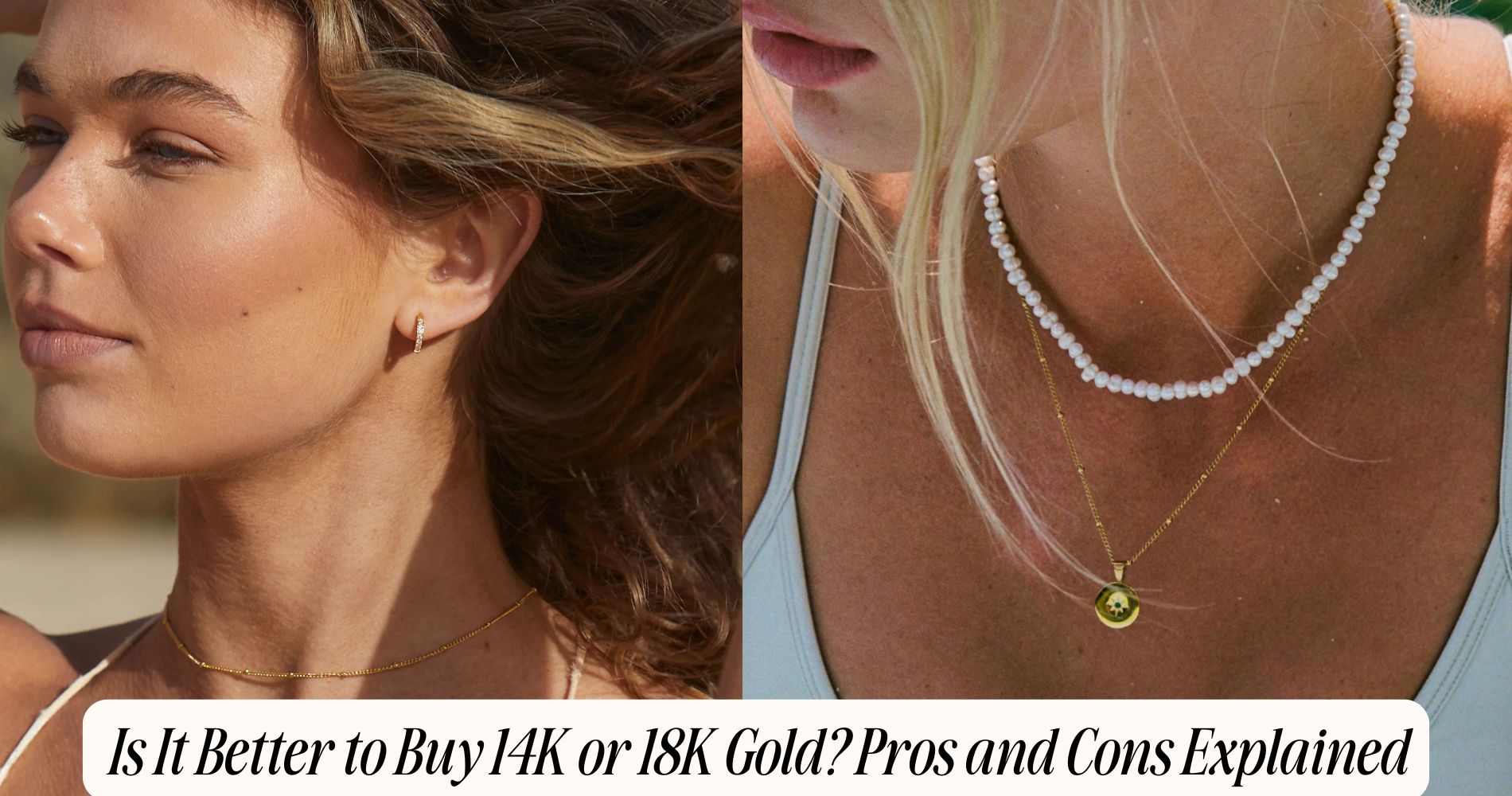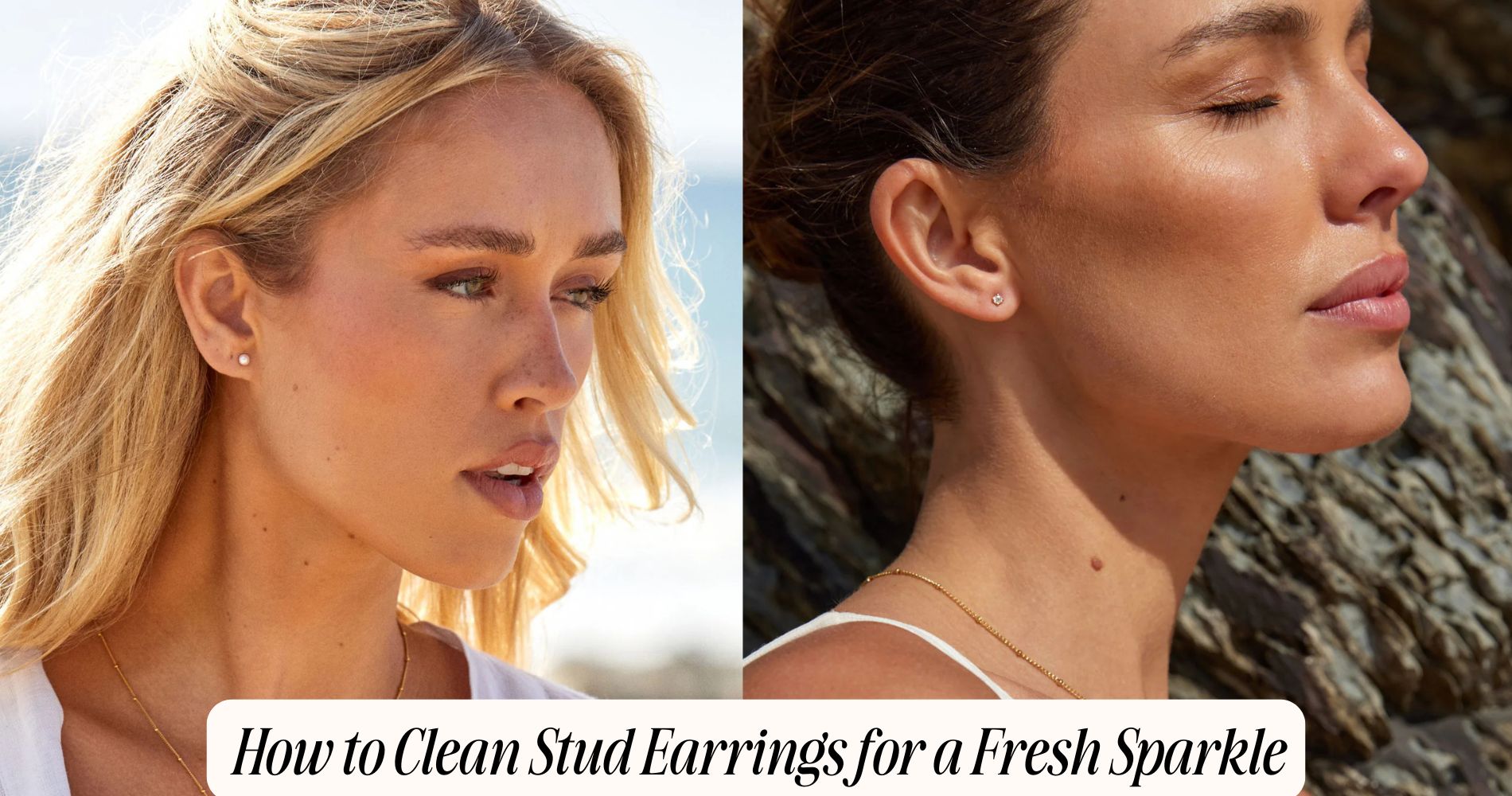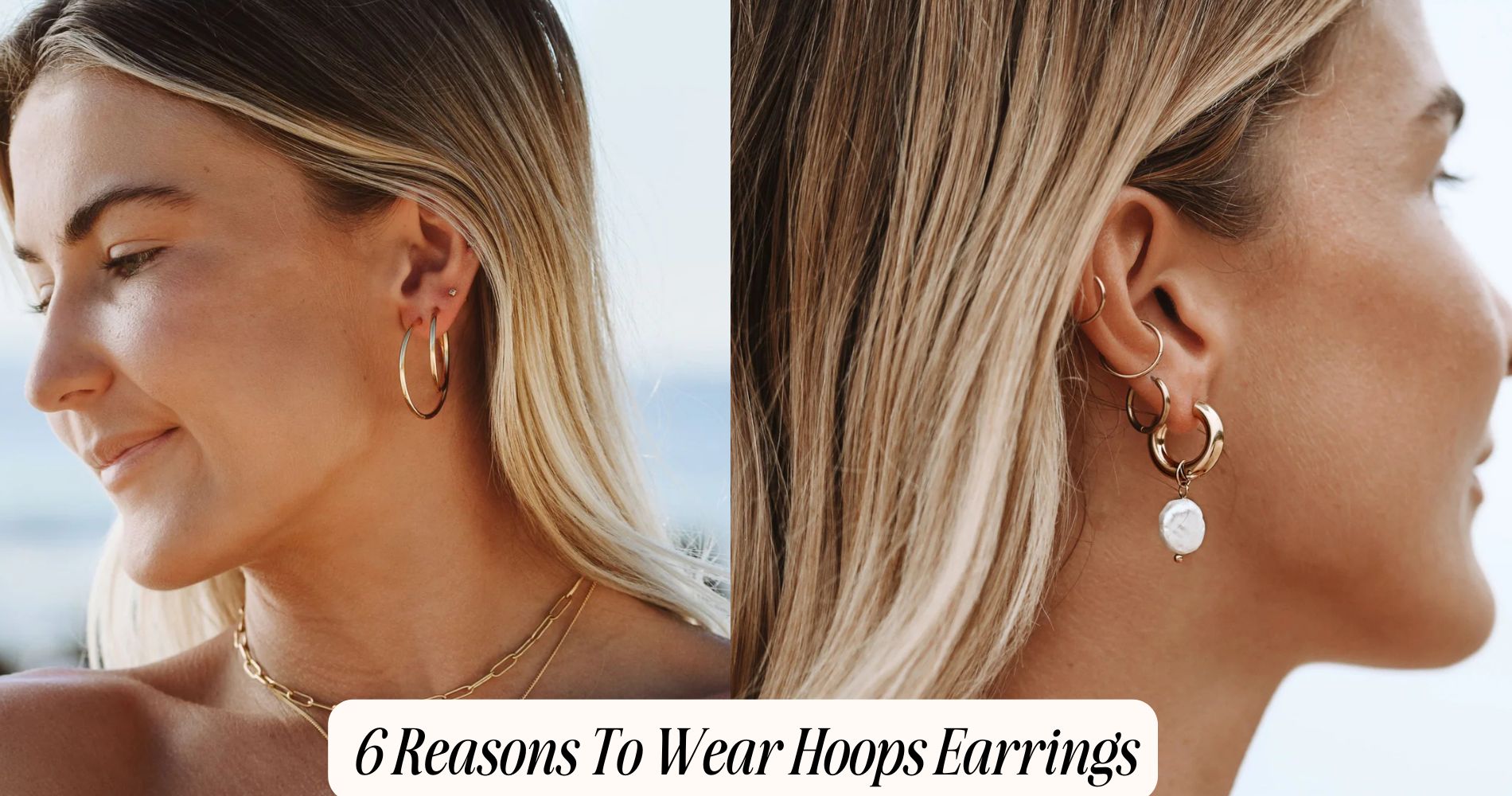
Is It Better to Buy 14K or 18K Gold? Pros and Cons Explained
Is it better to buy 14K or 18K gold? When choosing between these two options, it's essential to weigh purity, durability, and cost. 14K gold, with 58.3% pure gold, is more affordable and resilient for everyday wear, making it less prone to scratches. However, it lacks the richer hue of 18K gold, which contains 75% pure gold, offering a more luxurious color and better resale value. While 18K gold is less likely to cause skin irritation, it’s softer and demands extra care. Your decision should align with your lifestyle and budget. Explore our simple gold jewelry collection for elegant pieces that suit your needs.
Understanding Gold Purity
When it comes to understanding gold purity, it's vital to know how karats measure the content of gold in your jewelry. Karats indicate the proportion of pure gold in an alloy, with 24K representing pure gold. For instance, 14K gold contains 58.3% pure gold, while 18K gold has 75% pure gold. This distinction impacts both the value and durability of your pieces.
Different gold alloy types, such as yellow, white, and rose gold, blend pure gold with other metals like copper or silver. These metals not only enhance strength but also influence color and overall appearance.
As you consider your options, it's important to stay informed about gold market trends, impacting pricing and availability.
In recent years, the demand for higher karat gold has surged, reflecting a shift in consumer preferences towards quality and luxury. However, 14K gold remains a popular choice for everyday wear due to its balance of beauty and resilience.
Understanding these factors will guide you in making an informed decision, ensuring you select the right gold purity that aligns with your personal style and practical needs.
What Is 14K Gold?
14K gold, comprising 58.3% pure gold mixed with other metals, strikes a balance between beauty and practicality. This alloy typically includes copper, silver, and zinc, which enhance its durability and strength.
One of the key 14k gold characteristics is its resistance to scratching and tarnishing, making it an excellent choice for everyday wear. You won't have to worry as much about your jewelry losing its luster over time.
In terms of color, 14K gold can vary from yellow to rose, depending on the specific metals used in the alloy. This versatility in appearance allows you to select pieces that align with your personal style.
The applications of 14K gold are vast. You'll find it commonly used in rings, necklaces, bracelets, and earrings, appealing to a wide audience due to its affordability compared to higher karat options.
Additionally, 14K gold is often favored for engagement and wedding rings, as its durability can withstand daily wear while still offering a luxurious look.
What Is 18K Gold?
18K gold consists of 75% pure gold, combined with 25% other metals, which enhances its durability and color.
This composition not only increases its resistance to wear but also offers a richer hue compared to lower karat options.
As you consider your choices, understanding the benefits of 18K gold can help you make an informed decision.
Composition of 18K Gold
What makes 18K gold a popular choice for jewelry? Its composition plays a significant role. Comprising 75% pure gold and 25% alloy components, 18K gold strikes a balance between luxury and durability.
The alloy components often include metals like copper, silver, and palladium, which enhance strength and alter color. For instance, copper can give a warm, reddish hue, while palladium contributes to a white finish.
When you consider gold sourcing, it's important to note that high-quality gold is typically sourced from reputable suppliers. The purity of the gold affects not only the jewelry's appearance but also its overall value.
Since 18K gold contains a higher gold content compared to 14K gold, it's generally more expensive. However, it's still malleable enough to create intricate designs without compromising durability.
Understanding the composition of 18K gold helps you make informed purchasing decisions. If you value a blend of luxury and resilience, this alloy is worth considering.
Keep in mind the impact of the alloy components on both the aesthetic and functional properties of the jewelry you choose.
Benefits of 18K Gold
Choosing jewelry made from 18K gold offers several advantages, making it an attractive option for many buyers. One of the most significant benefits is its higher gold content—75% compared to 58.3% in 14K gold. This results in a richer, more vibrant color, enhancing the overall appearance of your pieces.
Additionally, 18K gold is more hypoallergenic, reducing the likelihood of skin reactions, which is essential for those with sensitive skin.
From an investment perspective, 18K gold holds considerable investment potential. Its higher gold content contributes to better durability and longevity, making it a wise choice for heirloom pieces. When it comes time to sell, you'll likely find that 18K gold jewelry retains a higher resale value due to its superior quality and popularity among buyers.
The aesthetic appeal, combined with the potential for long-term value retention, makes 18K gold a compelling option. Whether you're purchasing for personal enjoyment or as an investment, 18K gold jewelry can provide both beauty and financial security, ensuring that you make a smart choice for your collection.
Pros of 14K Gold
When considering gold jewelry, the advantages of 14K gold stand out clearly. One of the most significant benefits is its affordability factor. Compared to 18K gold, 14K gold typically comes at a lower price point, making it a great option for budget-conscious shoppers. This affordability allows you to purchase more pieces or invest in larger items without breaking the bank.
Another notable advantage is fashion versatility. 14K gold combines durability with a rich appearance, making it suitable for various styles and occasions. Whether you're dressing up for a formal event or going casual, 14K gold complements a wide range of outfits.
Its lower gold content also means it's less prone to scratching and tarnishing, maintaining its luster over time.
Additionally, 14K gold is available in various colors, including yellow, white, and rose gold, allowing you to express your personal style easily. This variety enhances its appeal, as you can mix and match pieces to create a distinctive look.
Cons of 14K Gold
While 14K gold offers several advantages, it also comes with notable drawbacks that should be considered. One significant issue is its lower purity compared to 18K gold. This means that 14K gold contains a higher percentage of alloy metals, which can sometimes lead to allergic reactions for individuals sensitive to certain metals like nickel.
If you or someone you know has a history of skin sensitivities, this is an essential factor to evaluate before making a purchase.
Another downside is the resale value. When you decide to sell your jewelry, 14K gold typically fetches a lower price than its 18K counterpart due to its reduced gold content. If you're investing in gold primarily for its long-term value, you might find that 14K gold doesn't hold its worth as well over time.
Additionally, the durability of 14K gold is a double-edged sword. While it's more resistant to scratching and damage, this toughness comes at the cost of a less luxurious appearance.
If you're looking for that rich, deep gold color, 14K mightn't meet your expectations as effectively as 18K.
Pros of 18K Gold
When considering 18K gold, you'll find several advantages that set it apart from lower karat options.
Its higher purity not only enhances the richness of its color, but it also tends to be more compatible with your skin, reducing the likelihood of allergic reactions.
These factors make 18K gold a compelling choice for those seeking quality and wearability in their jewelry.
Higher Purity Advantage
The allure of 18K gold lies in its higher purity, offering distinct advantages over its 14K counterpart. Composed of 75% gold, 18K gold greatly reduces alloy content, which can be beneficial for those with allergy concerns. If you've experienced reactions to metals like nickel, opting for 18K can provide peace of mind, as it typically contains fewer irritants.
Another advantage of 18K gold is its superior resale value. As it's made from a higher percentage of gold, its intrinsic value is greater than that of 14K gold. When the time comes to sell or trade your jewelry, you'll find that buyers often prefer 18K pieces, elevating your potential return on investment.
In addition, the higher purity of 18K gold means it generally retains its quality longer, resisting tarnish and wear. This durability can translate into a lasting investment, as your pieces will likely maintain their appeal over time.
When you weigh these factors, the higher purity of 18K gold provides considerable advantages, making it a strong contender for your next jewelry purchase.
Richer Color Appeal
Boasting a richer color, 18K gold captivates with its warm, vibrant hue that sets it apart from 14K gold. This higher gold content results in a deeper, more luxurious gold hue, which appeals to many buyers who appreciate the aesthetics of fine jewelry.
The color contrast between 18K and 14K gold is noticeable, with the former offering a more pronounced yellow tone that enhances its overall beauty.
When you wear 18K gold, you're not just investing in a piece of jewelry; you're also embracing a status symbol that signifies quality and elegance. The rich gold hue of 18K gold complements a variety of skin tones, making it a versatile choice for various styles and occasions.
Whether you're dressing up for a formal event or adding a touch of luxury to everyday wear, the vibrant color of 18K gold elevates your look.
Better Skin Compatibility
Many wearers find that 18K gold offers better skin compatibility compared to lower karat options. This is primarily due to its higher gold content, which means it contains less alloy metal. The alloys in lower karat gold, like nickel or copper, can be irritating for those with skin sensitivity, leading to allergic reactions.
When you choose 18K gold, you're opting for a material that's less likely to cause discomfort. The increased purity not only enhances its aesthetic appeal but also makes it a safer choice for sensitive skin. Many people report fewer instances of rashes or skin irritation when wearing 18K gold compared to 14K gold, which has a higher proportion of potentially irritating alloys.
Moreover, if you have a known sensitivity to specific metals, 18K gold typically contains fewer of these allergens, making it a more suitable option.
While the cost might be higher, the benefits regarding comfort and skin health could outweigh the price difference. Overall, if you prioritize skin compatibility, 18K gold is a sound investment that supports both style and comfort.
Price Comparison
When it comes to pricing, understanding the differences between 14K and 18K gold is vital for making a wise investment. 14K gold contains 58.3% pure gold, while 18K gold has 75% gold content. This difference typically results in 18K gold being considerably more expensive, often costing 20-30% more than 14K options.
Market trends can also influence these prices. For example, when gold prices rise, the cost of both 14K and 18K gold jewelry increases, but the percentage difference may remain relatively consistent.
When considering your budget, it's important to weigh not just the initial cost, but also the potential resale value. Generally, 18K gold retains a higher resale value due to its greater gold content, appealing to buyers looking for quality.
However, the resale market can fluctuate, so it's wise to research current trends and consult with jewelers regarding the value of specific pieces.
Ultimately, while 14K gold may be more budget-friendly upfront, investing in 18K gold could offer better long-term returns, depending on market conditions.
Durability and Maintenance
Understanding the differences in durability and maintenance between 14K and 18K gold is just as important as considering their price.
14K gold, with its lower gold content and higher percentage of alloy metals, tends to be more resistant to scratches and dents, making it a suitable choice for everyday wear. The additional alloys in 14K gold contribute to its strength, making it less prone to damage from daily activities.
In contrast, 18K gold, while richer in gold content, is softer and more susceptible to scratches. If you're looking for jewelry that can withstand regular use without showing signs of wear, 14K might be the better option.
However, if you prefer the look and feel of 18K gold, be prepared for more frequent maintenance.
Cleaning methods vary for both types. For 14K gold, a simple soap-and-water solution is often sufficient, while 18K gold may require more gentle cleaning to avoid scratching.
In both cases, avoid harsh chemicals and abrasive materials. Ultimately, understanding these durability aspects will help you choose jewelry that aligns with your lifestyle and maintenance preferences.
Making Your Decision
Choosing between 14K and 18K gold involves weighing several key factors that can influence your final decision.
First, consider your personal preference regarding color and appearance. 18K gold has a richer, more vibrant hue due to its higher gold content, while 14K offers a slightly lighter color, which some may find appealing.
Next, think about your lifestyle factors. If you lead an active life or work with your hands frequently, 14K may be the better choice due to its increased durability and resistance to scratching.
On the other hand, if you're looking for a piece that stands out and you're willing to invest in maintenance, 18K gold could be more suitable.
Price is another critical element; 18K gold typically costs more due to its higher gold content.
Weigh your budget against the benefits each option offers. Ultimately, the decision should reflect your style, how often you'll wear the jewelry, and how much you're willing to spend.
Frequently Asked Questions
Can I Mix 14K and 18K Gold Jewelry?
You can mix 14K and 18K gold jewelry, but be mindful of gold compatibility. Mixing metals may alter the appearance and durability of your pieces, so consider how they wear together before combining them.
How Does Gold Color Differ Between 14K and 18K?
The gold color differs between 14K and 18K due to their gold alloy composition. 18K has more pure gold, resulting in a richer hue. However, 14K offers greater color durability and resistance to scratching.
Is 14K or 18K Gold Better for Sensitive Skin?
When considering gold for sensitive skin, 18K gold's higher purity typically results in fewer skin reactions and gold allergies. However, individual sensitivities vary, so it is crucial to test both types before making a decision.
Conclusion
Ultimately, the choice between 14K and 18K gold depends on your priorities. If you value affordability and durability, 14K gold might be your best bet. On the other hand, if you're drawn to higher purity and a richer color, 18K gold is worth considering, despite its higher cost and slightly reduced durability. Carefully weigh these factors against your budget and lifestyle to make the most informed decision that suits your needs.

























Leave a comment
This site is protected by hCaptcha and the hCaptcha Privacy Policy and Terms of Service apply.